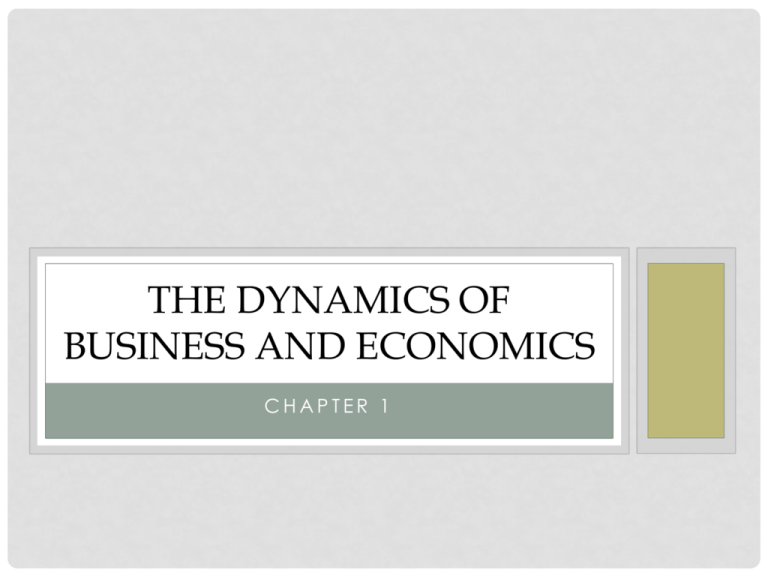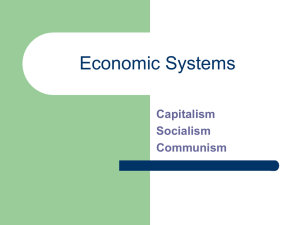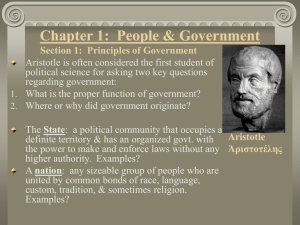The Dynamics of Business and Economics
advertisement

THE DYNAMICS OF BUSINESS AND ECONOMICS CHAPTER 1 THE NATURE OF BUSINESS • To create profits by: • Selling products – Cars, food, clothing • Providing services – Healthcare, insurance • Tell me more services - BUSINESS VS. NONPROFIT ORGANIZATION • Business • An individual or organization that tries to earn a profit by providing products that satisfy people’s needs, ex. IBM, CocaCola • Nonprofit Organization • Provides products, especially services, for some purpose other than profits, ex. The Salvation Army, 4300 American colleges & universities. THE GOALS OF BUSINESS • For-Profit Sector: • PROFIT – the difference between what it costs to make and sell a product and what the customer pays for it. • Nonprofit Sector: • GOALS – may provide goods or services but not for the purpose of earning profits THE PEOPLE AND ACTIVITIES OF BUSINESS People: Owners Employees Customers Other stakeholders: Investors Regulatory Agencies Activities: Management Marketing Finance WHY STUDY BUSINESS? • It provides employment for most people. • It provides the majority of products needed to survive and enjoy life. • It will help prepare you for your future career. • It will help you become a better informed consumer and member of society. • You get to have me as a teacher! EDUCATION PAYS MEDIAN WEEKLY SALARY & UNEMPLOYMENT RATE BY EDUCATION LEVEL ECONOMICS • Economics is the study of how scarce resources are used to produce outputs—goods and services, in other words the study of how individuals and groups of individuals strive to satisfy their needs and wants by making decisions within a social system TYPES OF RESOURCES USED BY BUSINESS • Natural • land, forests, etc. (not made by people) • Human • physical/mental abilities used by people produce goods and services • Financial • funds necessary to acquire needed natural and human resources to WHAT IS AN ECONOMIC SYSTEM? • The way a society distributes its resources to produce goods and services. • Addresses the issue of how to fulfill unlimited demand with limited supply of resources. (Scarcity) ECONOMIC SYSTEMS ATTEMPT TO ANSWERS 3 QUESTIONS • What should be produced? • How should it be produced? • Who should share in what is produced? TYPES OF ECONOMIC SYSTEMS • Communism • Socialism • Capitalism • Mixed COMPARISON OF COMMUNISM, SOCIALISM, AND CAPITALISM Communism Socialism Capitalism Business Ownership Most businesses are owned and operated by the government. The government owns and operates major industries; individuals own small businesses. Individuals own and operate all businesses. Competition None. The government owns and operates everything. Restricted in major industries; encouraged in small business. Encouraged by market forces and government regulations. Profits Excess income goes to the government. Profits earned by small businesses may be reinvested in the business; profits from governmentowned industries go to the government. Individuals are free to keep profits and use them as they wish. COMPARISON OF COMMUNISM, SOCIALISM, AND CAPITALISM Communism Socialism Capitalism Product availability and price Consumers have a limited choice of goods and services; prices are usually high. Consumers have some choice of goods and services; prices are determined by supply and demand. Consumers have a wide choice of goods and services; prices are determined by supply and demand. Employment options Little choice in choosing a career; most people work for governmentowned industries or farms. Some choice of careers; many people work in government jobs. Unlimited choice of careers. ECONOMIC SYSTEMS AND WHERE THEY OCCUR Communism: Socialism: Capitalism: China Sweden United States North Korea Germany Canada Cuba France Australia Viet Nam Israel Japan Laos Denmark Brazil MIXED ECONOMIES • Most countries of the world have elements of more than one economic system. THE FREE-ENTERPRISE SYSTEM • Individuals can own property and pass it on to their heirs. • People and businesses can earn profits and use them as they wish. • Individuals and businesses can determine how their businesses operate. • Individuals can choose their career, where to live, and what to buy. SUPPLY AND DEMAND • Supply: • The number of products business is willing to sell at different prices at a specific time. • An upward sloping curve on a graph. • Demand: • The number of goods and services that customers are willing to buy at different prices at a specific time. • A downward sloping curve on a graph. EQUILIBRIUM PRICE OF HANDMADE RUGS Prices of Rugs (dollars) $800 Equilibrium Price $650 $500 $350 $200 0 1 2 3 5 6 4 Handmade Rugs 7 EQUILIBRIUM PRICE • The price at which the number of products that businesses are willing to supply equals the amount of products that consumers are willing to buy at a specific moment in time FOUR COMPETITIVE ENVIRONMENTS Pure Competition Many small businesses sell one standardized product. Monopolistic competition There are fewer businesses than in a pure-competition system, and the differences between the goods they sell are small. Oligopoly Very few businesses sell a product; the product they sell can be similar or different. Monopoly There is only one producer of a product in a given market. BUSINESS CYCLE • The rise and fall of the economic activity over time (Draw) • Prosperity – is a peak of economic activity • Recession – economic activity slows, Decline in GDP for 2 quarters • Depression – Deep recession that affects the entire economy & lasts for several years • Recovery – Economic activity picks up and consumer confidence rises, which leads to more spending • Contractions vs. Expansions • Inflation – Rise in the price of goods/services ECONOMIC INDICATORS • What is an economic indicator? • Why do they matter? • What are some? GROWTH OF THE AMERICAN ECONOMY The Early Economy The Industrial Revolution The Manufacturing and Marketing Economies The Service & Internet-based Economy EXPLORE YOUR CAREER OPTIONS What are some of the changes in the work environment that contribute to the transformation of the traditional career track? FAST FACT: Enterprise Leasing is one of the nation’s largest employers of college graduates, hiring over 8000 graduates in 2011








